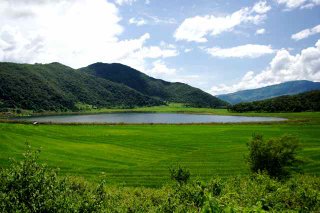The Congressional Gold Medal awarded to the Dalai Lama in 2006
The Dalai Lama has received numerous awards over his spiritual and political career. On 22 June 2006, he became one of only four people ever to be recognized with Honorary Citizenship by the Governor General of Canada. On 28 May 2005, he received the Christmas Humphreys Award from the Buddhist Society in the United Kingdom. Most notable was the Nobel Peace Prize, presented in Oslo on 10 December 1989 (see below).
Other notable awards and honors include:
• Honorary citizenship of Paris on 7 June 2009
• German Media Prize Berlin on 10 February 2009
• Honorary citizenship of Italy in Venice on 10 February 2009
• Honorary citizenship of Rome on 10 February 2009
• Honorary Doctoral Degree from Jagiellonian University on 8 December 2008
• Honorary Degree from Lehigh University on 13 July 2008
• Honorary citizenship of Wrocław,[129] voted 24 June 2008
• Honorary Doctoral Degree of Philosophy from London's Metropolitan
University on 21 May 2008
• Honorary citizenship of Paris,[132] voted 21 April 2008, the same day as Hu Jia
• Honorary Degree of Doctor of Humane Letter from the University of Washington in April 2008
• Inaugural Hofstra University Guru Nanak Interfaith Prize on 24 March 2008
• Honorary Doctorate in chemistry and pharmacy from University of Münster on 20 September 2007
• Honorary Doctorate from Southern Cross University on 8 June 2007
• Presidential Distinguished Professorship from Emory University in February 2007
• Honorary Doctorate in Humane Letters conferred by the State University of New York at Buffalo in September 2006
• Honorary citizenship of Canada in 2006
• Honorary citizenship of Ukraine, during the anniversary of the Nobel Prize on 9 December 2006 in Mc Leod Ganj.
• United States Congressional Gold Medal on 27 September 2006
• Key to New York City from Mayor Bloomberg on 25 September 2005
• Honorary Doctoral Degree of Philosophy from University of Tartu, Estonia on 27 May 2005
• Honorary Doctor of Laws from the University of British Columbia on 19 April, 2004
• Honorary Fellowship of Liverpool John Moores University 27 May 2004
• Jaime Brunet Prize for Human Rights on 9 October 2003
• International League for Human Rights Award on 19 September 2003
• Honorary Doctoral Degree from University of San Francisco on 5 September 2003
• Life Achievement Award from Hadassah Women's Zionist Organization on 24 November 1999
• Four Freedoms Award from the Franklin and Eleanor Roosevelt Institute on 4 June 1994
• World Security Annual Peace Award from the Lawyers Alliance for New York on 27 April 1994
• Berkeley Medal from University of California, Berkeley, on 20 April 1994
• Peace and Unity Awards from the National Peace conference on 23 August 1991
• Earth Prize from the United Earth and U.N. Environmental Program on 5 June 1991
• Advancing Human Liberty from the Freedom House on 17 April 1991
• Le Prix de la Memoire from the Fondation Danielle Mitterrand on 4 December 1989
• Raoul Wallenberg Human Rights Award (or Raoul Wallenberg Congressional Human Rights Award) from the Congressional Human Rights Caucus on 21 July 1989
• Key to Los Angeles from Mayor Bradley in September 1979
• Key to San Francisco from Mayor Feinstein on 27 September 1979
Nobel Peace Prize
On 10 December 1989 the Dalai Lama was awarded the Nobel Peace Prize. The committee recognized his efforts in "the struggle of the liberation of Tibet and the efforts for a peaceful resolution instead of using violence." The chairman of the Nobel committee said that the award was "in part a tribute to the memory of Mahatma Gandhi." In his acceptance speech the Dalai Lama criticized China for using force against student protesters during the Tiananmen Square protests of 1989. He said their efforts were not in vain. His speech focused on the importance of the continued use of non-violence and his desire to maintain a dialogue with China to try and resolve the situation.
1. Reign- 17 November 1950 – present
2. Predecessor- Thubten Gyatso
3. Tibetan བསྟན་འཛིན་རྒྱ་མཚོ
4. Wylie bstan ’dzin rgya mtsho
5. Pronounciation tɛ̃tsĩ catsʰo (IPA)
6. Transcription
7. (PRC) Dainzin Gyaco
8. TDHL Tenzin Gyatso
9. Chinese 丹增嘉措
10. Pinyin Dānzēng Jiācuò
11. Father- Choekyong Tsering
12. Mother- Diki Tsering
13. Born- 6 July 1935 (1935-07-06) (age 74)
14. Taktser, Qinghai (previously, Amdo, Tibet)



No comments:
Post a Comment